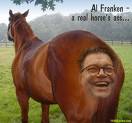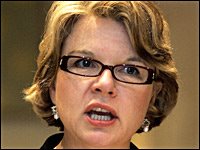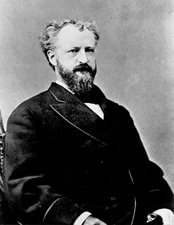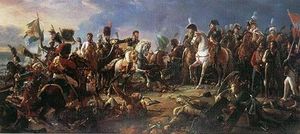
I am slowly going through War and Peace. In the coming battle of Moscow Tolstoy makes some wonderful comments about war through Prince Andrei. Before the battle of Moscow Andrei loses his father. He is visited by the eternal hippie - Pierre on the eve of the battle and they get into a discussion about the next day's battle. Pierre, who never seems to get it, makes some inane comments about the honor and glory of war. Andrei responds in a way that explains that battles are not about glory. He comments "A battle is won by those who firmly resolve to win it! Why did we lose the battle at Austerlitz? The French losses were almost equal to ours, but very early we said to ourselves that we were losing the battle, and we did lose it. And we said so because we had nothing to fight for there, we wanted to get away from the battlefield as soon as we could. 'We've lost, so let us run,' and we ran. If we had not said that till the evening, heaven knows what might not have happened. But tomorrow we shan't say it! You talk about our position, the left flank weak and the right flank too extended," he went on. "That's all nonsense, there's nothing of the kind. But what awaits us tomorrow? A hundred million most diverse chances which will be decided on the instant by the fact that our men or theirs run or do not run, and that this man or that man is killed, but all that is being done at present is only play. The fact is that those men with whom you have ridden round the position not only do not help matters, but hinder. They are only concerned with their own petty interests."
But Andrei, who uses the night before the battle to reflect on his life comments further - battles to Tolstoy are not about heroics or tactics - "To them it is only a moment affording opportunities to undermine a rival and obtain an extra cross or ribbon. For me tomorrow means this: a Russian army of a hundred thousand and a French army of a hundred thousand have met to fight, and the thing is that these two hundred thousand men will fight and the side that fights more fiercely and spares itself least will win. And if you like I will tell you that whatever happens and whatever muddles those at the top may make, we shall win tomorrow's battle. Tomorrow, happen what may, we shall win!" Motives in battles are simplified.
Andrei is not convinced that all the niceties of war are justified. "Not take prisoners," Prince Andrew continued: "That by itself would quite change the whole war and make it less cruel. As it is we have played at war- that's what's vile! We play at magnanimity and all that stuff. Such magnanimity and sensibility are like the magnanimity and sensibility of a lady who faints when she sees a calf being killed: she is so kind-hearted that she can't look at blood, but enjoys eating the calf served up with sauce. They talk to us of the rules of war, of chivalry, of flags of truce, of mercy to the unfortunate and so on. It's all rubbish! I saw chivalry and flags of truce in 1805; they humbugged us and we humbugged them. They plunder other people's houses, issue false paper money, and worst of all they kill my children and my father, and then talk of rules of war and magnanimity to foes! Take no prisoners, but kill and be killed! He who has come to this as I have through the same sufferings..."
Andrei is also not convinced about noble motives "If there was none of this magnanimity in war, we should go to war only when it was worth while going to certain death, as now. Then there would not be war because Paul Ivanovich had offended Michael Ivanovich. And when there was a war, like this one, it would be war! And then the determination of the troops would be quite different. Then all these Westphalians and Hessians whom Napoleon is leading would not follow him into Russia, and we should not go to fight in Austria and Prussia without knowing why. War is not courtesy but the most horrible thing in life; and we ought to understand that and not play at war. We ought to accept this terrible necessity sternly and seriously. It all lies in that: get rid of falsehood and let war be war and not a game. As it is now, war is the favorite pastime of the idle and frivolous. The military calling is the most highly honored."
He then concludes with an elegant set of prose about war. "But what is war? What is needed for success in warfare? What are the habits of the military? The aim of war is murder; the methods of war are spying, treachery, and their encouragement, the ruin of a country's inhabitants, robbing them or stealing to provision the army, and fraud and falsehood termed military craft. The habits of the military class are the absence of freedom, that is, discipline, idleness, ignorance, cruelty, debauchery, and drunkenness. And in spite of all this it is the highest class, respected by everyone. All the kings, except the Chinese, wear military uniforms, and he who kills most people receives the highest rewards.
"They meet, as we shall meet tomorrow, to murder one another; they kill and maim tens of thousands, and then have thanksgiving services for having killed so many people (they even exaggerate the number), and they announce a victory, supposing that the more people they have killed the greater their achievement. How does God above look at them and hear them?" exclaimed Prince Andrew in a shrill, piercing voice. "Ah, my friend, it has of late become hard for me to live. I see that I have begun to understand too much. And it doesn't do for man to taste of the tree of knowledge of good and evil.... Ah, well, it's not for long!" he added.
A good deal of the discussion about Iraq and indeed any engagement that Americans have at this time in our history attempts to make war somehow prettier than it is. But Andrei's soliloquies make clear that getting into a war should not be a casual thing and that completing a war is not about making compromises. His words particularly touched me today. Throughout this campaign season the democrats have equivocated first about their initial commitment to the war in Iraq and then with some absurd alternatives designed to make narrow political advantage. What Tolstoy's comments made me think about is how imporant it is to make sure that democratic systems actually take the time to think out these campaigns carefully and then to be willing to commit the energy to win them.

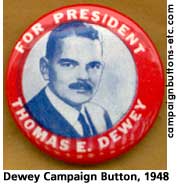 Question of the day - which is John Kerry?
Question of the day - which is John Kerry?







